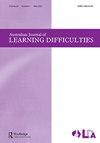Efficacy of an evidence-based literacy preparation program for young children beginning school
IF 1.6
Q3 EDUCATION, SPECIAL
引用次数: 3
Abstract
Abstract This study aimed to provide evidence regarding the efficacy of an early literacy preparation program, PreLit, designed to improve the skills of young Australian children. Participants comprised 240 children in eight schools attending their first year of schooling. Children in the four experimental group schools received instruction in the program while children in the four comparison group schools continued with typical literacy activities in their classrooms. All children were assessed on measures of emergent literacy and language skills prior to and following intervention. It was found that 91% of students were in the bottom quartile for phonological awareness at pre-test. While neither the children nor their schools were randomly allocated to groups, the mean scores for the two groups were very similar at pre-test on all measures. Analyses showed that although the means for the two groups were not statistically different on any of the measures at post-test, significantly fewer students in experimental schools remained in the bottom quartile and more moved into the top quartile for phonological awareness skills, compared with students in the comparison schools. Fine grain analyses, taking into account additional qualitative data about the schools, helped to clarify these findings.以证据为基础的幼儿识字准备计划的成效
摘要本研究旨在为早期识字准备项目PreLit的有效性提供证据,该项目旨在提高澳大利亚儿童的识字技能。参与者包括来自8所学校的240名第一年入学的儿童。四所实验组学校的孩子们接受了该计划的指导,而四所对照组学校的孩子们继续在教室里进行典型的扫盲活动。在干预之前和之后,对所有儿童的读写能力和语言技能进行了评估。结果发现,91%的学生在前测时语音意识处于倒数四分之一。虽然这些孩子和他们的学校都没有被随机分配到不同的小组,但两组在所有测试前的平均得分都非常相似。分析表明,尽管两组学生在测试后的任何测量方法上的平均值没有统计学差异,但与比较学校的学生相比,实验学校的学生在语音意识技能方面处于最低四分位数的人数明显减少,而进入最高四分位数的人数明显增加。细粒度分析,考虑到有关学校的额外定性数据,有助于澄清这些发现。
本文章由计算机程序翻译,如有差异,请以英文原文为准。
求助全文
约1分钟内获得全文
求助全文
来源期刊

Australian Journal of Learning Difficulties
EDUCATION, SPECIAL-
CiteScore
1.80
自引率
11.10%
发文量
8
 求助内容:
求助内容: 应助结果提醒方式:
应助结果提醒方式:


